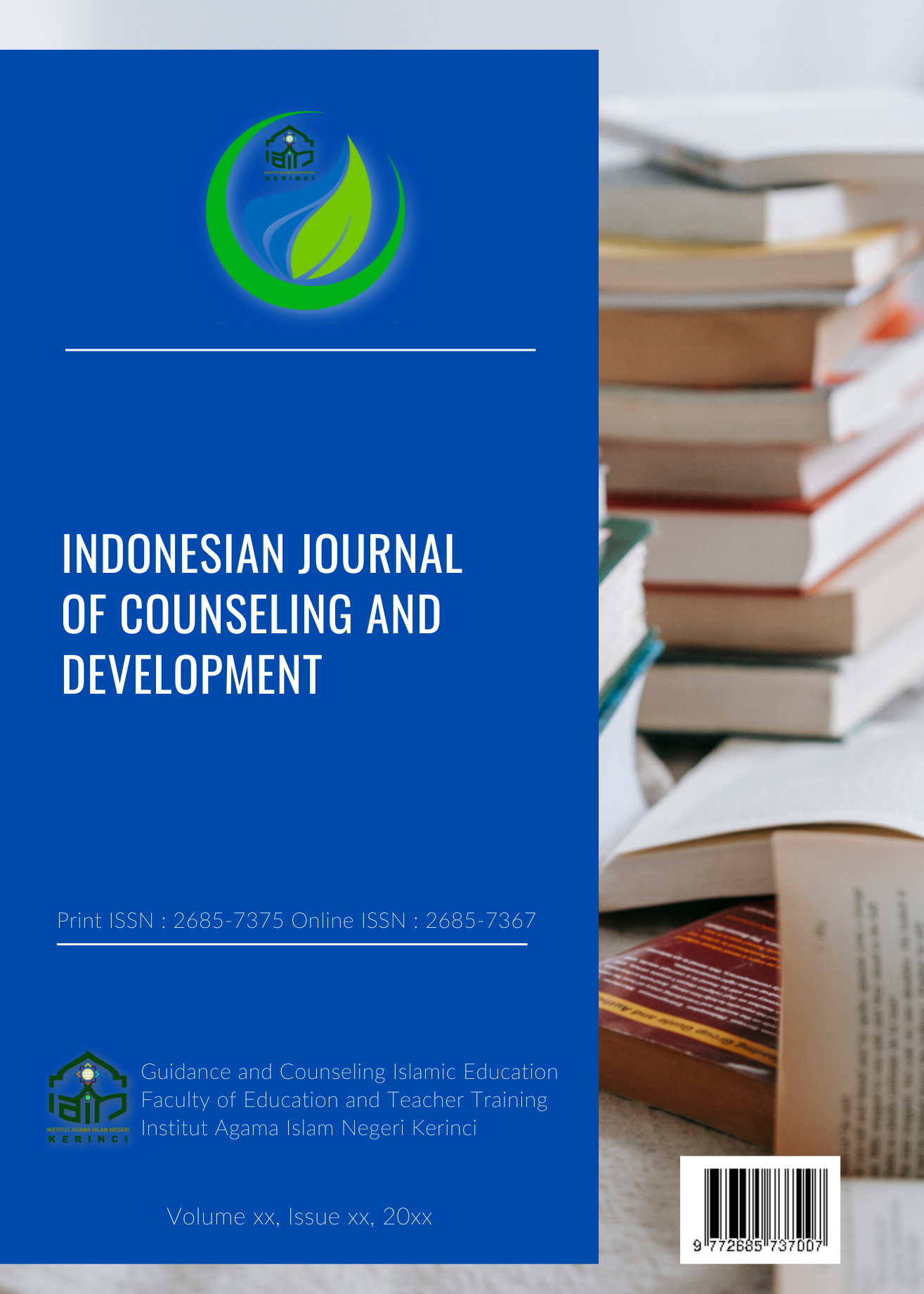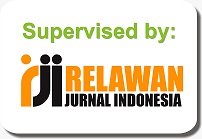The Role of Counselors in Spiritual Counseling to Reduce Bullying Trauma among Students in Islamic Higher Education Institutions
Abstract
This study aims to examine the role of counselors in providing spiritual counseling services to reduce bullying trauma among students in Islamic higher education institutions. The research design employs a quantitative approach using a survey method. The participants are lecturers from the Islamic Education Guidance and Counseling Department at State Islamic Higher Education Institutions. Data collection instruments include a questionnaire measuring lecturers' readiness and understanding in implementing spiritual counseling. The data analysis technique used is descriptive analysis. The findings indicate that the majority of lecturers feel prepared to provide spiritual counseling services, as reflected in their experience, knowledge, and confidence in integrating Islamic values into the counseling process. However, there is a subset of lecturers who are not fully prepared, highlighting the need for ongoing professional training and support. Despite a high interest in spiritual counseling, its implementation in practice, particularly in addressing bullying cases, remains suboptimal. These findings suggest a gap between interest and practice, emphasizing the importance of developing relevant and practical spiritual counseling models. Overall, the results reinforce the argument that Islam-based spiritual counseling, which incorporates values such as patience, sincerity, reliance on God, and self-purification, can be an effective approach to mitigating the psychological impacts of bullying
Downloads
References
Abd Razak, M. A., Zainal Abidin, M. S., & Harun, M. S. (2023). Islamic Psychospiritual Theory According to the Perspective of Maqasid al-Sharia. Islāmiyyāt: International Journal of Islamic Studies, 45(1), 69. https://doi.org/10.17576/islamiyyat-2023-4501-07
Akbar, F., & Silvianetri, S. (2023). Konseling Islam Dalam Menanamkan Nilai-Nilai Spritual Pelaku Bullying. Jurnal Mahasiswa BK An-Nur: Berbeda, Bermakna, Mulia, 9(2), 424–431. https://doi.org/10.31602/jmbkan.v9i2.10669
Asadzandi, M. (2020). An Islamic Religious Spiritual Health Training Model for Patients. Journal of Religion and Health, 59(1), 173–187. https://doi.org/10.1007/s10943-018-0709-9
Asmita, W., & Irman, I. (2022). Aplikasi Teknik zikir dalam Konseling Terhadap Kesehatan Mental. Al-Ittizaan: Jurnal Bimbingan Konseling Islam, 5(2), 80–85. https://doi.org/10.24014/ittizaan.v5i2.18221
Dille, A. M. (2023). Healing Spiritual Wounds: The Experience of Counselors Working With Religious Trauma Survivors. Moody Theological Seminary.
Elaine, M. (2024, March 2). KPAI Ungkap Sekitar 3.800 Kasus Perundungan Sepanjang 2023, Hampir Separuh Terjadi di Lembaga Pendidikan. https://www.suarasurabaya.net/kelanakota/2024/kpai-ungkap-sekitar-3-800-kasus-perundungan-sepanjang-2023-hampir-separuh-terjadi-di-lembaga-pendidikan/
Elkins, D. N. (2005). A humanistic approach to spiritually oriented psychotherapy. In L. Sperry & E. P. Shafranske (Eds.), Spiritually oriented psychotherapy (pp. 131–151). American Psychological Association. https://doi.org/10.1037/10886-006
Faiz, A., Yandri, H., Kadafi, A., Mulyani, R. R., Nofrita, N., & Juliawati, D. (2019). Pendekatan Tazkiyatun An-Nafs untuk membantu mengurangi emosi negatif klien. Counsellia: Jurnal Bimbingan Dan Konseling, 9(1), 65. https://doi.org/10.25273/counsellia.v9i1.4300
Galán, C. A., Stokes, L. R., Szoko, N., Abebe, K. Z., & Culyba, A. J. (2021). Exploration of experiences and perpetration of identity-based bullying among adolescents by race/ethnicity and other marginalized identities. JAMA Network Open, 4(7), e2116364--e2116364. https://doi.org/10.1001/jamanetworkopen.2021.16364
Hamrick, F. A., Evans, N. J., & Schuh, J. H. (2002). Foundations of student affairs practice: How philosophy, theory, and research strengthen educational outcomes. John Wiley & Sons.
Hapsari, D. D., & Purwoko, B. (2016). Perilaku Bullying pada Mahasiswa Fakultas Bahasa dan Seni (FBS) di Universitas Negeri Surabaya. Jurnal Mahasiswa Bimbingan Konseling, 6(3), 1–9.
Harahap, E. S., Azrina, N., & Hasanah, N. A. (2023). Integrasi Nilai-nilai Islami dalam Layanan Bimbingan Karir: Tantangan dan Peluang bagi Konselor Profesional. Innovative: Journal Of Social Science Research, 3(3), 961–975. https://j-innovative.org/index.php/Innovative/article/view/2313
Kartal, H., Balantekin, Y., Bilgin, A., & Soyuçok, M. (2019). Factors Affecting Bullying in Home and School Life: A Mixed Method Research. Journal of Qualitative Research in Education, 7(1), 1–36. https://doi.org/10.14689/issn.2148-2624.1.7c1s.3m
Khosravi, F., Fereidooni-Moghadam, M., Mehrabi, T., & Moosavizade, S. R. (2022). The Effect of a Spirituality-Based Program on Stress, Anxiety, and Depression of Caregivers of Patients with Mental Disorders in Iran. Journal of Religion and Health, 61(1), 93–108. https://doi.org/10.1007/s10943-021-01372-w
Koburtay, T., Jamali, D., & Aljafari, A. (2023). Religion, spirituality, and well-being: A systematic literature review and futuristic agenda. Business Ethics, the Environment & Responsibility, 32(1), 341–357. https://doi.org/10.1111/beer.12478
Koenig, H. G. (2018). Religion and mental health: Research and clinical applications. Academic Press.
KPAI. (2024, March 8). Kasus Kekerasan Terhadap Anak pada Satuan Pendidikan Terus Terjadi: KPAI Lakukan FGD dengan Stakeholder dan Sepakati Beberapa Rekomendasi. https://www.kpai.go.id/publikasi/kasus-kekerasan-terhadap-anak-pada-satuan-pendidikan-terus-terjadi-kpai-lakukan-fgd-dengan-stakeholder-dan-sepakati-beberapa-rekomendasi
Laeheem, K. (2013). Factors associated with bullying behavior in Islamic private schools, Pattani province, southern Thailand. Asian Social Science, 9(3), 55. https://doi.org/10.5539/ass.v9n3p55
Moura, D. R. de, Cruz, A. C. N., & Quevedo, L. de Á. (2011). Prevalence and characteristics of school age bullying victims. Jornal de Pediatria, 87, 19–23.
Ningrum, A. I. (2018). Bullying dan Kekerasan ( Studi Kualitatif Ospek Fakultas di Universitas Airlangga ). Jurnal Sosiologi Universitas Airlangga, 37.
Nuraini, T., Gayatri, D., & Sunarya, C. E. (2024). Intervensi spiritualitas untuk menurunkan tingkat kecemasan dan depresi terhadap pasien kanker. Journal of Telenursing (JOTING), 6(1), 1067–1075. https://doi.org/10.31539/joting.v6i1.9534
Omar Dev, R. D., Tengku Kamalden, T. F., Geok, S. K., Mohd Ayub, A. F., & Ismail, I. A. (2018). Spiritual Intelligence on Health Behavior’s Among Malaysian University Students in a Malaysian Public University: The Mediating Role of Self Efficacy. Malaysian Journal of Movement, Health & Exercise, 7(2). https://journals.lww.com/mjmh/fulltext/2018/07020/spiritual_intelligence_on_health_behaviours_among.5.aspx
Pratama, B. D., Kadafi, A., Fakhriyani, D. V., Hariyani, I. T., & Kholidah, M. (2023). Cyber Counseling Berbasis Nilai Agama sebagai Upaya Mengembangkan Kesehatan Mental Remaja di Era Vuca. Edu Consilium : Jurnal Bimbingan Dan Konseling Pendidikan Islam, 4(2), 41–51. https://doi.org/10.19105/ec.v4i2.9760
Putri, S. O., & Silalahi, B. R. (2017). Gambaran Perilaku Bullying Pada Mahasiswa Umn Alwashliyah. JURNAL EDUKASI: Jurnal Bimbingan Konseling, 3(2), 146. https://doi.org/10.22373/je.v3i2.3092
Rayner, C. (1997). The incidence of workplace bullying. Journal of Community & Applied Social Psychology, 7(3), 199–208.
Richards, P. S., Pargament, K. I., Exline, J. J., & Allen, G. E. K. (2023). Introduction: Bringing spiritually integrated psychotherapies into the health care mainstream. In P. S. Richards, G. E. K. Allen, & D. K. Judd (Eds.), Handbook of spiritually integrated psychotherapies (pp. 3–29). American Psychological Association. https://doi.org/10.1037/0000338-001
Safdar, S., Waqar, Y., Anis, F., & Muhammad, Y. (2024). Beyond Access: Tackling Bullying to Ensure True Inclusion in Pakistan’s Educational Landscape. Journal of Social &Amp; Organizational Matters, 3(3), 114–130. https://doi.org/10.56976/jsom.v3i3.102
Sidek, N. F. M., Sawai, R. P., & Sawai, J. P. (2021). Spiritual Competence and Self-Efficacy among Addiction Trainee Counsellors in Malaysia. In K. M. Noor, B. A. Hadi, & R. P. Sawai (Eds.), International Conference on Communication, Management and Humanities 2021 (ICCOMAH-2) E-Proceeding (p. 53). AID Conference.
Sihombing, S., & Alamsyah, M. B. (2024). Integrasi Nilai-Nilai Tasawuf dalam Mengembangkan Pendidikan Karakter (Studi Pemikiran Buya Hamka). Jurnal Man-Anaa, 1(1), 64–75. https://e-journal.staimaswonogiri.ac.id/index.php/man-anaa/article/view/260
Stephens, D. W. (2020). Trauma-Informed Pedagogy for the Religious and Theological Higher Education Classroom. In Religions (Vol. 11, Issue 9). https://doi.org/10.3390/rel11090449
Suhartono, S., Umar, S., & Kuncoro, A. (2024). Implementation of spiritual guidance and counseling for students at jamilurrahman islamic high school bantul. Jurnal Ilmu Pendidikan Dan Sains Islam Interdisipliner, 19–27. https://doi.org/10.59944/jipsi.v3i1.270
Sujadi, E., Yandri, H., & Juliawati, D. (2021). Perbedaan Resiliensi Siswa Laki-laki dan Perempuan yang Menjadi Korban Bullying. Psychocentrum Review, 3(2), 174–186. https://doi.org/10.26539/pcr.32665
Syafii, M. H., & Azhari, H. (2024). Interaction Between Spiritual Development and Psychological Growth: Implications for Islamic Educational Psychology in Islamic Students. Journal of Islamic Education and Ethics, 3(1), 29–48. https://doi.org/10.18196/jiee.v3i1.69
Yandri, H., Kholidin, F. I., Sujadi, E., & Juliawati, D. (2024). Finding Inner Peace : An Exploration of Forgiveness Therapy for Bullying Trauma Recovery. Al-Musyrif: Jurnal Bimbingan Dan Konseling Islam, 7(1), 24–38. https://doi.org/10.38073/almusyrif.v7i1.1539
Yandri, H., Marsidin, S., & Karneli, Y. (2022). The impact of tazkiyatun an-nafs counseling in reducing the trauma of violence experienced by a wife. Jurnal Bimbingan Dan Konseling Ar-Rahman, 8(2), 179–184. https://doi.org/10.31602/jbkr.v8i2.9068
Copyright (c) 2024 Hengki Yandri, Dosi Juliawati

This work is licensed under a Creative Commons Attribution 4.0 International License.








